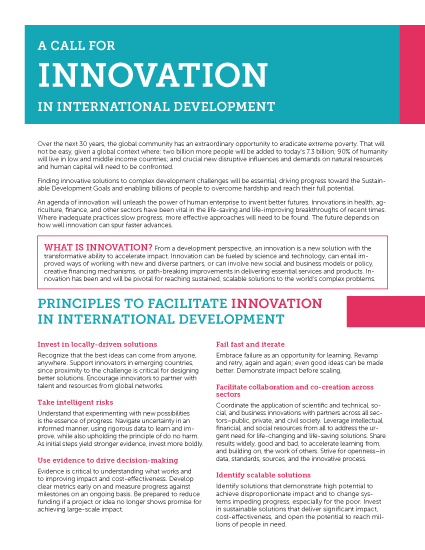- What We Do
- Agriculture and Food Security
- Democracy, Human Rights and Governance
- Economic Growth and Trade
- Education
- Ending Extreme Poverty
- Environment and Global Climate Change
- Gender Equality and Women's Empowerment
- Global Health
- Water and Sanitation
- Working in Crises and Conflict
- U.S. Global Development Lab
Over the next 30 years, the global community has an extraordinary opportunity to eradicate extreme poverty. That will not be easy, given a global context where: two billion more people will be added to today’s 7.3 billion; 90% of humanity will live in low and middle income countries; and crucial new disruptive influences and demands on natural resources and human capital will need to be confronted.
Finding innovative solutions to complex development challenges will be essential, driving progress toward the Sustainable Development Goals and enabling billions of people to overcome hardship and reach their full potential.
An agenda of innovation will unleash the power of human enterprise to invent better futures. Innovations in health, agriculture, finance, and other sectors have been vital in the life-saving and life-improving breakthroughs of recent times. Where inadequate practices slow progress, more effective approaches will need to be found. The future depends on how well innovation can spur faster advances.
WHAT IS INNOVATION? From a development perspective, an innovation is a new solution with the transformative ability to accelerate impact. Innovation can be fueled by science and technology, can entail improved ways of working with new and diverse partners, or can involve new social and business models or policy, creative financing mechanisms, or path-breaking improvements in delivering essential services and products. Innovation has been and will be pivotal for reaching sustained, scalable solutions to the world’s complex problems.
A Call For Innovation in International Development ![]() (pdf - 559k)
(pdf - 559k)
Principles to Facilitate Innovation in International Development
Invest in locally-driven solutions
Recognize that the best ideas can come from anyone, anywhere. Support innovators in emerging countries, since proximity to the challenge is critical for designing better solutions. Encourage innovators to partner with talent and resources from global networks.
Take intelligent risks
Understand that experimenting with new possibilities is the essence of progress. Navigate uncertainty in an informed manner, using rigorous data to learn and improve, while also upholding the principle of do no harm. As initial steps yield stronger evidence, invest more boldly.
Use evidence to drive decision-making
Evidence is critical to understanding what works and to improving impact and cost-effectiveness. Develop clear metrics early on and measure progress against milestones on an ongoing basis. Be prepared to reduce funding if a project or idea no longer shows promise for achieving large-scale impact.
Fail fast and iterate
Embrace failure as an opportunity for learning. Revamp and retry, again and again; even good ideas can be made better. Demonstrate impact before scaling.
Facilitate collaboration and co-creation across sectors
Coordinate the application of scientific and technical, social, and business innovations with partners across all sectors–public, private, and civil society. Leverage intellectual, financial, and social resources from all to address the urgent need for life-changing and life-saving solutions. Share results widely, good and bad, to accelerate learning from, and building on, the work of others. Strive for openness–in data, standards, sources, and the innovative process.
Identify scalable solutions
Identify solutions that demonstrate high potential to achieve disproportionate impact and to change systems impeding progress, especially for the poor. Invest in sustainable solutions that deliver significant impact, cost-effectiveness, and open the potential to reach millions of people in need.
Innovation thrives best when facilitated by a strong ecosystem of favorable enabling conditions, including better policy and regulatory frameworks, open data and standards, and expanded access for innovators to resources. More effectively tapping into capital flows through blended finance, for instance, will harness additional resources that far exceed the current capital available for poverty reduction. The same is true when the development of science, technology and innovation (STI) capabilities is promoted, by strengthening the regulatory, infrastructure, and human capacity foundations that support the growth of local STI ecosystems.
Innovation requires collaboration. Governments, the private sector, civil society, academia, development institutions, and donors need to work together more than ever before – crossing traditional boundaries -- to discover, fund, and scale new solutions and tap the energy of innovation needed to reduce poverty at scale. Action now can hasten the day when the Sustainable Development Goals will be met and billions of people will embrace each new day with opportunities not previously thought possible.








Comment
Make a general inquiry or suggest an improvement.